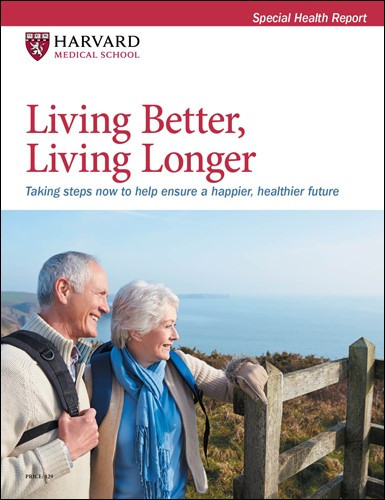Can you become a "super-ager"?
Some people live into their 90s with no signs of cognitive decline. What makes them special?
- Reviewed by Howard E. LeWine, MD, Chief Medical Editor, Harvard Health Publishing; Editorial Advisory Board Member, Harvard Health Publishing

The 2024 presidential election, in which the two leading candidates will turn 78 and 82 during the year, has raised the issue about cognitive health as people age.
But individuals known as "super-agers" have shown that for some, age really is only a number. "Super-agers are known to maintain peak mental prowess well into their 90s and avoid Alzheimer's disease and other dementias," says Dr. Daniel Daneshvar, chief of the Division of Brain Injury Rehabilitation at Harvard-affiliated Spaulding Rehabilitation Hospital. "While the general thinking is that memory declines and brain functions slow as we age no matter what, studies on super-agers suggest this is not inevitable, and there may be ways to maintain high levels of cognitive function for much longer in life."
The aging brain
The average brain declines in volume and weight by about 5% per decade after age 40, with a steeper decline after age 70. Brain shrinkage particularly affects the brain regions involved with learning and memory, like the frontal lobe and hippocampus. A smaller brain volume is also linked to less robust communication between brain regions, which leads to slower processing speed and can impair other cognitive functions.
"These usual age-related brain changes can affect thinking and make it harder to recall words and names, focus on tasks, and process new information," says Dr. Daneshvar.
The brains of super-agers, however, shrink at about half the average rate, and their memory and cognitive skills stay on par with younger brains. What goes on inside super-ager brains that accounts for this? Harvard investigators, publishing in the November 2021 issue of Cerebral Cortex, offer a clue.
They recruited 40 older adults who were identified as super-agers. The super-agers took a memory test while their brains were scanned with functional magnetic resonance imaging (fMRI), which shows the activity of different brain areas. For comparison, the researchers also carried out the memory test and fMRI scan on 41 young adults (average age 25). The super-agers performed similarly to the younger people on the memory tests. The fMRI also showed that activity in the super-agers' visual cortex, the brain area that processes visual input, was similar to that in the younger brains.
What's super about super-agers?
Studies have found that genetics is the greatest component in the state of aging brains.
"Science has identified about 100 genes common among super-agers, although it's unclear which ones in particular are linked with neurological benefits," says Dr. Daneshvar. "If you win the lottery and are born with those genes, you have a good chance of becoming a super-ager." But what if your genetic scratch-off is a bust? Can you still be a winner with super-aging?
"Super-agers also tend to follow a healthy lifestyle, and many reach their 90s free of problems like heart disease, diabetes, and high blood pressure," says Dr. Daneshvar. Here's a look at the healthy daily habits of many super-agers and how they may help protect your brain.
Eat more "superfoods." Many super-agers follow diets rich in foods high in antioxidants, polyphenols, and omega-3 fatty acids. These nutrients have been shown to fight inflammation and help protect the body from disease-causing cell damage. Examples include berries, whole grains (oatmeal, quinoa), fatty fish (salmon, trout), nuts (walnuts, almonds), olive oil, cruciferous vegetables (broccoli, brussels sprouts, cauliflower), avocados, and green tea.
Unsurprisingly, these foods are staples in many plant-based diets associated with brain and heart health, like the MIND, DASH, and Mediterranean diets. It's not certain which of the foods or amounts are ideal, so focus on meals that contain a variety of them.
Be more active. Super-agers tend to engage in more physical activity. Regular exercise has been found to help maintain brain volume and cognitive function, even if you begin later in life. Exercise sparks physiological changes in the body, such as the production of growth factors — chemicals that enhance brain cell function and survival and can actually stimulate formation of new brain cells. Many studies have suggested that the parts of the brain that control thinking and memory are larger in volume in people who exercise than in people who don't.
It doesn't matter what type of exercise you do. Research has found that walking, swimming, other aerobic activity (especially high-intensity interval training, or HIIT), strength training, tai chi, and yoga are all associated with improved memory. But consistency is key. "Being active on a regular basis leads to greater brain benefits," says Dr. Daneshvar.
Be more social. Super-agers tend to have more social interactions. Studies have shown that regular social engagement is associated with healthier brains. The opposite is also true: social isolation is linked to lower volume of gray matter in brain regions related to cognition.
Challenge yourself. Super-agers challenge their brains, and studies have shown that learning new things as you age aids memory. For instance, study a second language, learn a musical instrument, or adopt a new hobby.
Get good sleep. Super-agers also prioritize sleep. (Guidelines suggest seven to nine hours nightly.) "During sleep, the brain clears away metabolic waste that builds up early in the development of Alzheimer's disease," says Dr. Daneshvar. A study in the November 2022 issue of the journal Sleep found that trouble falling or staying asleep three or more nights per week for three months boosted the risk for worsening memory in older adults.
Image: © Deagreez/Getty Images
About the Author

Matthew Solan, Executive Editor, Harvard Men's Health Watch
About the Reviewer

Howard E. LeWine, MD, Chief Medical Editor, Harvard Health Publishing; Editorial Advisory Board Member, Harvard Health Publishing
Disclaimer:
As a service to our readers, Harvard Health Publishing provides access to our library of archived content. Please note the date of last review or update on all articles.
No content on this site, regardless of date, should ever be used as a substitute for direct medical advice from your doctor or other qualified clinician.
















